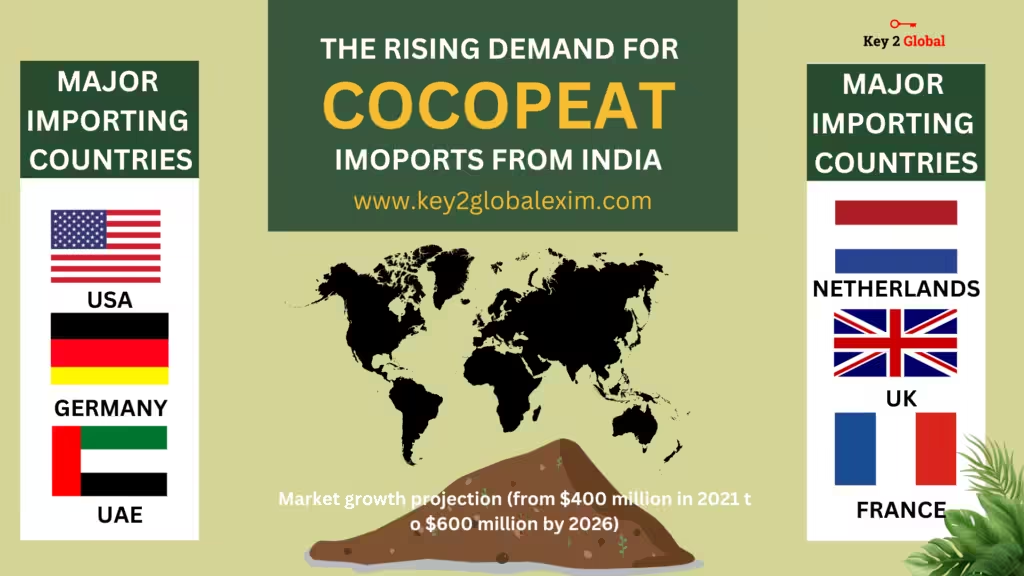Rising Demand for Cocopeat Imports from India
The global agricultural landscape is undergoing a significant transformation, with an increasing emphasis on sustainable practices. One of the key players in this shift is cocopeat, a versatile and eco-friendly growing medium derived from coconut husks. As countries worldwide seek sustainable alternatives for soil enhancement and plant growth, the demand for cocopeat imports from India has surged. This blog post explores the factors driving this rising demand and highlights the benefits of cocopeat as a sustainable agricultural solution. What is Cocopeat? Cocopeat, also known as coir pith or coir dust, is a natural, biodegradable material obtained from the fibrous husk of coconuts. It is widely recognized for its excellent water retention, aeration properties, and ability to improve soil structure. These characteristics make cocopeat an ideal choice for various agricultural applications, including: Soil Conditioning: Enhances soil health by improving moisture retention and aeration. Hydroponics: Serves as a sustainable growing medium for hydroponic systems. Seed Starting: Provides an ideal environment for germinating seeds. Factors Driving the Demand for Cocopeat Imports 1. Sustainability Initiatives As environmental concerns grow, many countries are implementing sustainability initiatives aimed at reducing carbon footprints and promoting eco-friendly practices. Cocopeat aligns perfectly with these goals, being a renewable resource that contributes to sustainable agriculture. 2. Increased Awareness of Organic Farming The global shift towards organic farming has led to a higher demand for natural soil amendments. Cocopeat is chemical-free and enhances soil fertility without harming the environment, making it a preferred choice among organic farmers. 3. Water Conservation Efforts With water scarcity becoming a pressing issue in many regions, cocopeat’s exceptional water retention capabilities have garnered attention. Its ability to hold moisture reduces the need for frequent irrigation, making it an attractive option for farmers looking to conserve water. 4. Growing Agricultural Exports Countries in Europe, North America, and the Middle East are increasingly importing cocopeat to support their agricultural sectors. The rising exports from India are driven by the country’s capacity to produce high-quality cocopeat at competitive prices. 5. Versatility in Applications Cocopeat is not limited to traditional agriculture; it is also used in landscaping, horticulture, and even as a substrate in mushroom cultivation. This versatility expands its market potential and attracts diverse buyers. Key Markets for Cocopeat Imports Cocopeat imports from India are gaining traction in several key markets: United States: With a growing interest in organic farming and sustainable practices, the U.S. has become one of the largest importers of cocopeat. European Union: Countries like Germany, France, and the Netherlands are leading consumers due to their strong emphasis on sustainability and organic agriculture. Middle East: Nations such as the UAE and Saudi Arabia import cocopeat to enhance agricultural productivity in arid climates. South Asia: Neighboring countries like Bangladesh and Sri Lanka are also significant markets for Indian cocopeat exports. You can check the services from Key2global here Quality Control Measures At Key2Global Exim, we prioritize quality throughout our packing process. We implement rigorous quality control measures to ensure that our cocopeat products meet the highest standards: Moisture Check: We conduct thorough moisture assessments to ensure optimal hydration levels. pH Testing: Our team performs pH tests to confirm that the cocopeat is within the ideal range for plant growth. Electrical Conductivity (EC) Check: We measure EC to evaluate salinity levels and ensure product safety. Key Highlights and Statistics Market Growth: The global cocopeat market was valued at approximately $400 million in 2021 and is expected to reach $600 million by 2026, growing at a CAGR of around 8%. Export Volume: India exports over 200,000 metric tons of cocopeat annually, with significant demand from countries like the USA (30%), Germany (20%), and the UAE (15%). Water Savings: Using cocopeat can reduce irrigation needs by up to 50%, making it crucial for water conservation. Soil Improvement: Incorporating cocopeat into soil can improve aeration and drainage by up to 30%, enhancing plant growth. These highlights illustrate the growing significance of cocopeat in sustainable agriculture and its rising demand in international markets. Conclusion The rising demand for cocopeat imports from India reflects a broader trend toward sustainable agricultural practices worldwide. As farmers and businesses increasingly recognize the benefits of this natural growing medium, Key2Global Exim is poised to meet this demand by providing high-quality cocopeat products directly sourced from Indian manufacturers.By investing in cocopeat as part of their agricultural strategies, countries can promote eco-friendly farming practices while enhancing soil health and conserving water resources. As we move forward, the importance of sustainable solutions like cocopeat will only continue to grow in the global agricultural landscape.
Rising Demand for Cocopeat Imports from India Read More »


